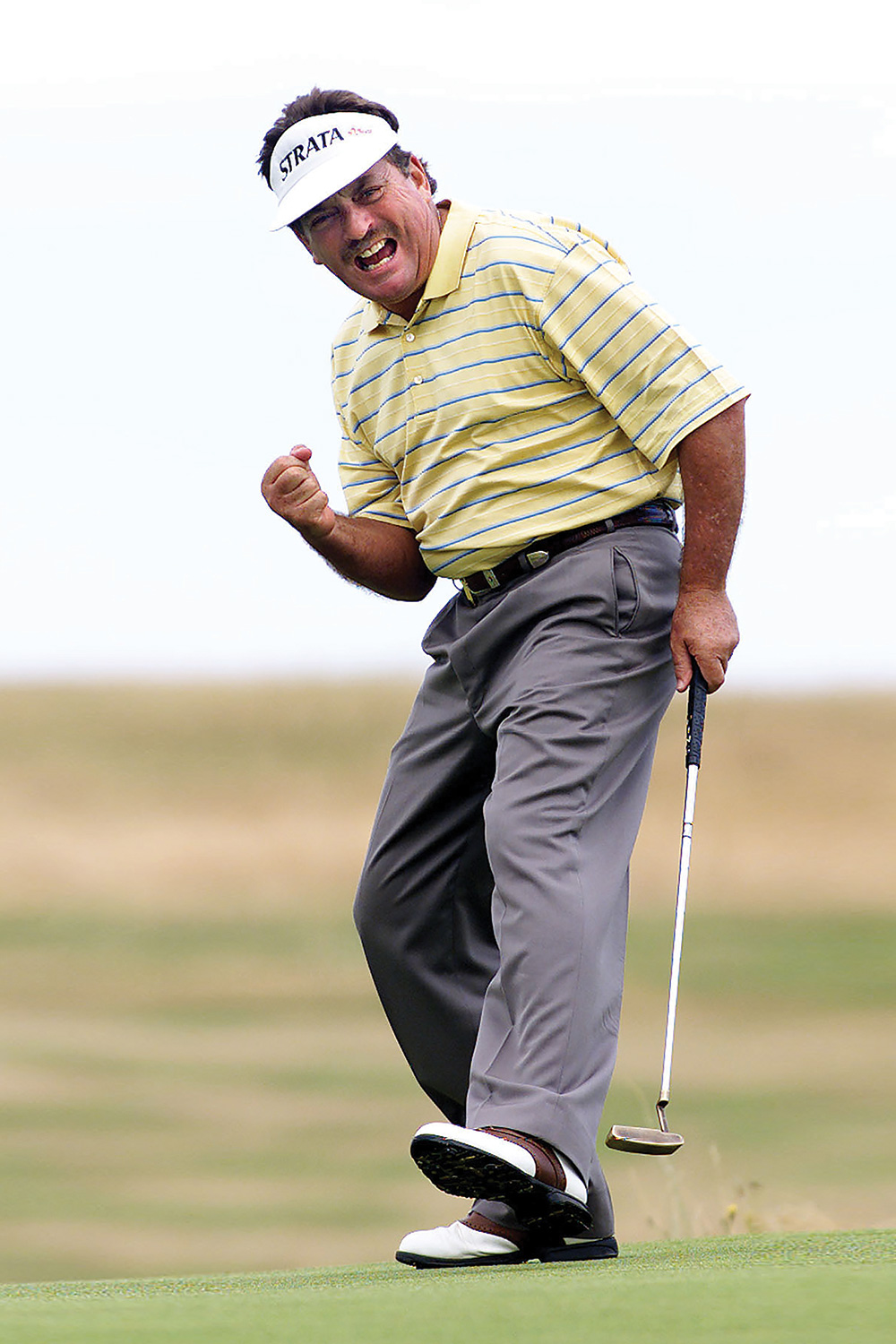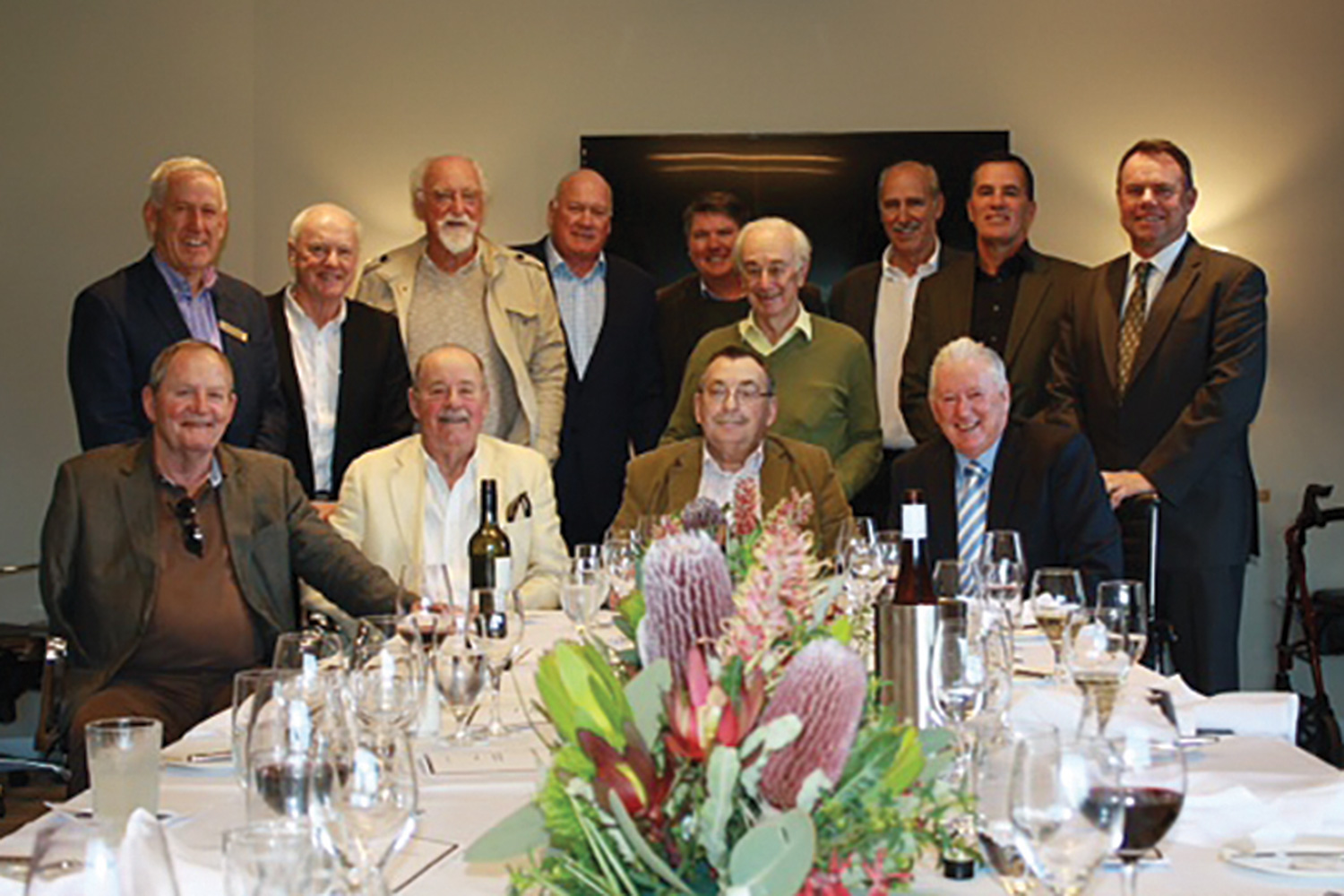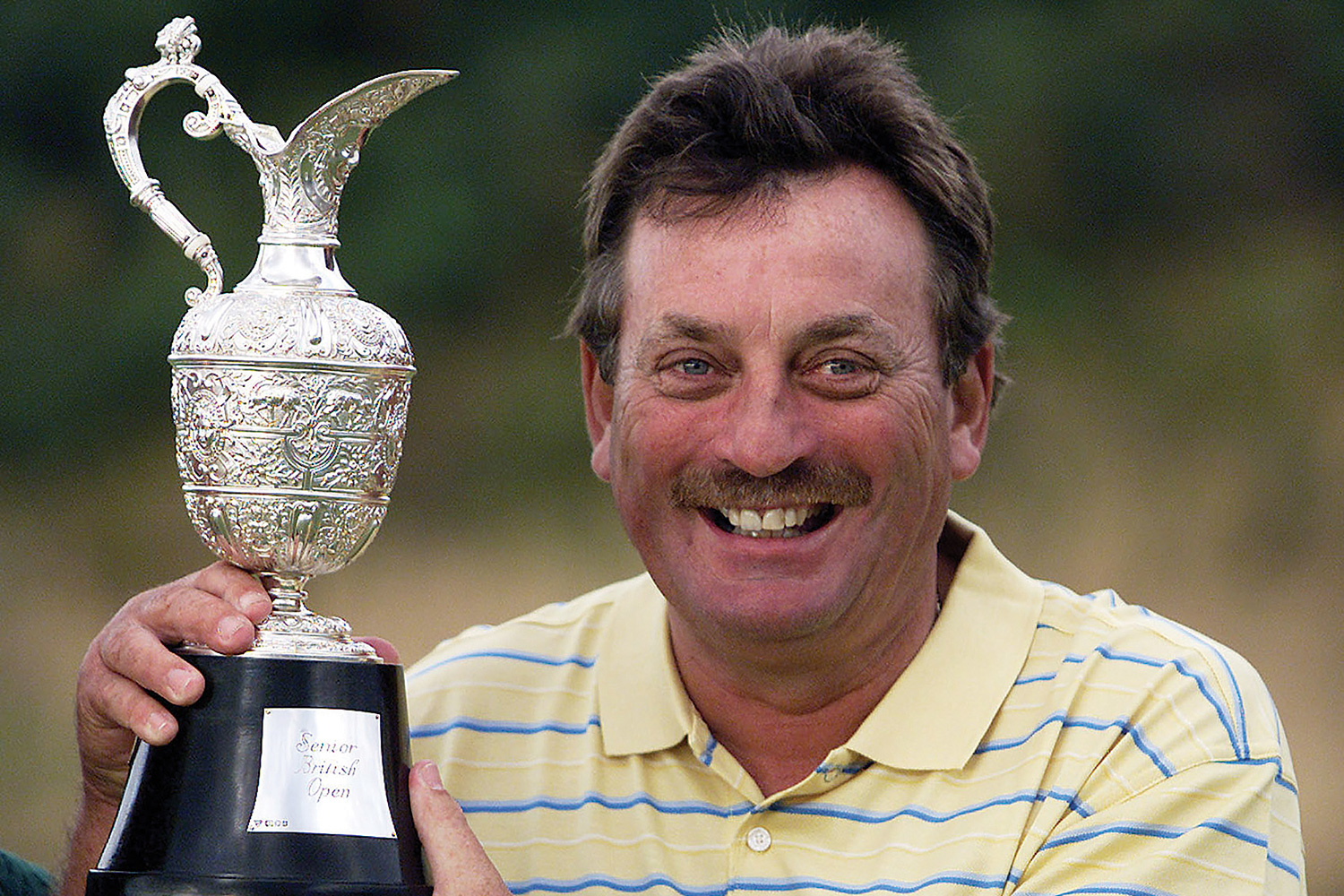69 | Melbourne | 2001 Senior British Open Champion
About two-and-a-half years ago and while only in my mid-60s, I found I was running out of energy just doing the day-to-day stuff, let alone playing golf. My GP sent me for tests and after spending 12 days in hospital they could not find anything wrong with me. Originally they thought it might have been a heart problem I had, because in England in 2004 I’d had heart palpitations and went ‘arse over tit’ at Wentworth. When they could not find anything, they decided to do a big scan of my whole body and that’s when they found a cancerous growth the “size of a cantaloupe” in one of my kidneys. When they went to take it out, the surgeons also found that unfortunately the cancer had progressed into a major vein and was causing a blockage. It had to be removed. This is usually a death sentence, but the surgeon was a mad keen golfer and reckoned that I was fit and strong enough to survive the operation. I spent eight days in intensive care and a further two weeks in hospital before coming home. Now the cancer has gone into my spine for the third time and it has come to the point where we don’t think we can beat it. But we’ve put up a good fight.
▶ ▶ ▶
I have been in Cabrini Palliative Care 13 times. The other day, as I hobbled down the hallway on a walking frame, one of the old blokes in here looked at me, did a bit of a double take and said, “Weren’t you Ian Stanley?” In the old days I would have blown up. But I just said to him, “Mate, I still am.”

I haven’t really played golf competitively for five years but I am really glad I made the effort to play on the Senior Tour in Europe. I won the Senior British Open in 2001 at Royal County Down. Two weeks earlier I had won the Senior PGA and I ended up winning the Order of Merit. My wife Pam was with me when I won the Senior Open and the president opened up the bar and gave me the run of the place as we celebrated long and hard into the night. In the end, I was standing on the bar with my (soft) spikes on, singing and telling stories. It was a fantastic night.
▶ ▶ ▶
 Pam and I are so pleased we did that whole senior thing in Europe. There were 90 guys playing each week. We tried to have a meal with every guy and his wife on the tour and I reckon we almost did. It was a happy time. It was all jokes and socialising until you pressed the start button. Then it became very competitive. Not long afterwards things started to go downhill with my health. Up until then I had been as strong as an ox and training all the time. I had a personal trainer to get fit for the Senior Tour and right up until I got sick, I was doing stretching exercises with Pam every morning.
Pam and I are so pleased we did that whole senior thing in Europe. There were 90 guys playing each week. We tried to have a meal with every guy and his wife on the tour and I reckon we almost did. It was a happy time. It was all jokes and socialising until you pressed the start button. Then it became very competitive. Not long afterwards things started to go downhill with my health. Up until then I had been as strong as an ox and training all the time. I had a personal trainer to get fit for the Senior Tour and right up until I got sick, I was doing stretching exercises with Pam every morning.
▶ ▶ ▶
Pam has MS and my illness has taken its toll on her and my three beautiful daughters. In a way it has been tougher for them because I have kept going. If I had passed away immediately, it would have been much easier on my family. People would have said, ‘Nice guy, bad luck he’s gone. Let’s have a drink and move on.’ Still, I have seen two more grandchildren born in that time and I now have seven little beauties. The eldest, Riley, who’s 8, put life in perspective the other day when I asked him if he wanted to see Pa playing golf. (I have a two-hour highlights package that someone put together from all the old VHS tapes.) He sat on the bed next to me, watched me hit one shot, then said, “That’s good, Pa. I’ll watch the rest after,” and climbed down off the bed.
▶ ▶ ▶
Sitting around in hospital as much as I have, you tend to do a lot of reflecting. I was glad I made the effort to go out there and play again when I turned 50 because I had left a bit out there. I had won a lot of tournaments, but I did not win an Australian Open or Australian PGA title. I did win every state open and a New Zealand Open. No one else has done that. When I look back, I was hit and miss. I’d either win or run second. Otherwise I would just make up the field.
▶ ▶ ▶
A couple of people said I wasn’t trying and was just having good fun with the sponsors. I became known as the “clown prince” and “Stan the man” and it irked me at times. The clown prince of golf? Oh well. We had a bit of fun. Was I too much of an on-course joker? I always admired Lee Trevino for the shots he hit as much as for being a good bloke on and off the course. My problem was an inability to concentrate. Sport psychologist Sean Lynch finally taught me how to do it when I was 50 and that’s why I had success, albeit belatedly, in Europe on the Senior Tour.
▶ ▶ ▶
The New Zealand Open win was the best performance of my career because I went wire-to-wire and saw off American Corey Pavin and Mike Clayton, who, unbeknown to me, was in the clubhouse after a great round. It was even sweeter because I had just turned 40 and everyone said I was past it. To be honest, I did leave a bit out there. People don’t remember who ran second and I made a habit of it – three times in the Victorian Open, second in the Tasmanian Open, three thirds in the Australian Masters. If I had won those, people would have said I was a superstar. I had a chance in an Australian Open one year at The Australian but finished third behind Gary Player. Would I do anything differently if I had my time again? Maybe. I would have tried more than once for a card in the US in the 1970s. I went under-prepared in 1972 when Bob Shearer won the qualifying school. It was gruelling over 90 holes, and I had just flown in and was all over the shop for the whole week.

When Jack Newton, Bob Shearer, Stewart Ginn and myself turned professional in 1970 – and, a couple of years later, Rodger Davis – we all got on well together. When we were overseas together in Europe, we stayed in the same hotels and travelled on the same flights. We even waited around at the course until we had all finished our rounds. We had fun. The English could not understand us; how we could party and then go out and win the tournament? The legendary English golf writer, Peter Dobereiner, asked me how we did it. I explained the Australian cricket team did the same thing and that it was part of our upbringing. We just go out and give it 100 percent. There were no gym sessions in those days. It was play hard and party hard afterwards, sometimes even during a tournament. We had our moments, but those guys I went to Europe with felt like your teammates in a footy or cricket team even though we were competing against one another. We travelled across the UK together in an old van with posters all over it. It is fair to say we caused a bit of havoc off the course but they were fun times.
▶ ▶ ▶
Golf can be a selfish and lonely sport, especially early in your career, and I think we all really enjoyed each other’s company. We were a fraternity in a way. I remember when Bob (Shearer) won the Australian Open in Sydney in 1982, we went into every sponsor’s marquee and had a drink with them. By the time we got on the plane back to Melbourne, we were flying. We drank the plane dry midway through the journey. I am not sure the young blokes would do that now but I think it was important. Sport in general has lost its sense of fun. There are no characters any more. They all go through the same routine. I am not decrying that, but when you hole a putt, punch the air for God’s sake. If someone’s a bit different in any sport, they tend to criticise them. People love watching good golf shots but they also like to see sportsmen with a little bit of charisma.
▶ ▶ ▶
Only recently, Huntingdale Golf Club, where I have played since my early teens, put on a lunch for me and a few close mates. Jack Newton came down from Sydney. Bob (Shearer) was there and my great AFL mates Mark Maclure and Tony Jewell. I am a mad Carlton fan and Maclure has been a loyal mate since his playing days. It was a fantastic day and Jack was in great form. I would have loved to have had Peter Thomson there, too. But my childhood hero, who later generously took me into his golf design business, has not been in the best of heath lately, either. On hearing I was ill, he visited me in hospital and I gave him a hug. “Don’t press too hard,” he said. “I’ll cry.”



